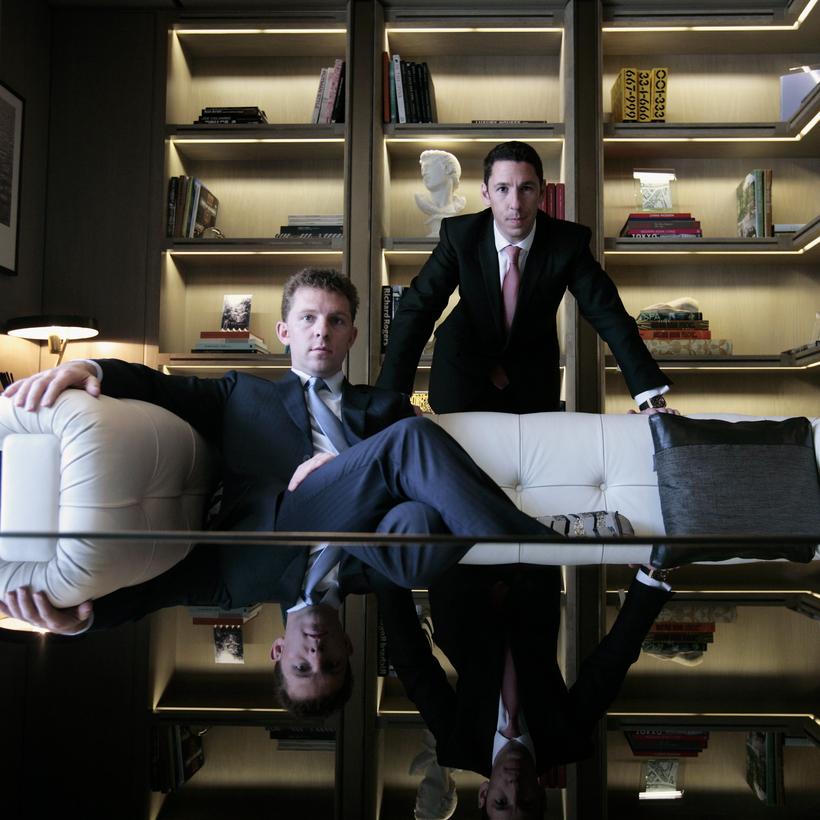“Good grief,” says one of the architects behind One Hyde Park, the most expensive tower block in the history of London. “Anybody would think we’d actually designed a germ-warfare-research institute!” But the building is far more troublesome than that. When it opened, a decade ago, in a Cristal-soaked ceremony that launched 5,000 golden balloons into the Knightsbridge atmosphere, One Hyde Park ushered in a stark new era of London’s “global” wealth. (It’s global only if you happen to come from a mineral-rich former Soviet state and don’t mind making a few enemies.)
It also distorted Britain’s property market forever—an outrageously lavish and opulent hideaway that set an eye-popping high-water mark for house prices in the capital, dragged everyone else’s mortgages up with it, and became a gilded anchor for offshore riches. Worst of all, perhaps, it was deemed gently tacky by the commentator classes—bland and showy all at once, like a first-class lounge with panic rooms. “A hutch for the improbably rich,” as A. A. Gill once put it. “A self-made ghetto of naff and gilt.”

And now, the most expensive apartment in the most expensive tower block in the most expensive borough of one of the most expensive cities in Europe has been put up for sale—and by none other than Nick Candy himself, one half of the formidable Candy brothers, who masterminded the monstrous development in the first place.
It’s rumored to have an asking price of some $241 million, for which you get 18,000 square feet over two floors, a cocktail bar, a media room, a private spa, five bedrooms, two terraces, a champagne room (distinct, somehow, from the 750-bottle wine room), and views over Harrods. It may seem odd that King Candy would wish to leave his castle—the headline-bait property that made both his name and his fortune. But now is not such a bad time to cash in.
Several buyers are said to be circling—at least two of which are considering paying with crypto-currencies—in an ultra-ultra-prime property market that has been turbocharged by a weak pound and the rolling uncertainties over Brexit. Besides, Candy may need the liquidity for an even splashier project, if his recent comments to The Times of London are to be believed—“something bigger” than One Hyde Park. “It’s very early days. I’m not sure it will come off the ground,” he said. “But it’s not in London, not in the U.K. The world is changing.”
It was deemed gently tacky by the commentator classes—bland and showy all at once.
This, as anyone close to the property market will tell you, is a not-so-coded jab at London mayor Sadiq Khan, who Candy believes has torpedoed the city’s status as a honeypot for global investment, owing to Khan’s failure to curb violent knife crime. The billionaire tycoon even set up a $1.4 million fund in an attempt to knock Khan off his perch in the recent mayoral elections, and lobbied city bigwigs for donations to support the opposing Conservative candidate. Khan ultimately won a second term, but the race was far closer than expected.
It is weight-throwing behavior typical of the Candy brothers, who have never been afraid of a scrap or a hustle. In 2017, the pair won a court case after being accused of extortion, blackmail, and intimidation in a soap-opera trial that laid bare the sheer gaudiness and gore of their empire.

The press drooled over details of the Candys’ well-known pals (Katy Perry was paid almost $2 million to sing at Nick’s wedding, where Princesses Beatrice and Eugenie were among the guests), not to mention their billionaire’s toy box, complete with private jet and Catch Me if You Candy powerboat.
But the British press was even more animated by the allegedly furious atmosphere of the Candys’ boardroom, in which staff members were alleged to be regularly reduced to tears, and one employee was said to have been sacked “on the spot” after revealing he was seriously ill. Worse, the Candys were accused of threatening to sell on a debt to the Russian Mob, and of warning a debtor to “think about your pregnant wife.” They denied all allegations and were later cleared of these charges, but a faint stain remains, like Pétrus on an oyster-cream carpet. “Even if you find us completely innocent,” Nick Candy told the judge during the case, “the rest of our lives there is going to be a slight smell.”
Something is certainly a little unsavory down in Surrey, if the residents of Egham are to be believed. Christian Candy, the younger of the pair, has just won permission to make some ground-shaking changes in the leafy borough of Runnymede, a wealthy commuter belt in the southeast of England.
In 2017, the pair won a court case after being accused of extortion, blackmail, and intimidation.
The developer will soon be demolishing a gatehouse and a set of stables in order to replace them with a new building and garage, and is also starting work on a labyrinthine tunnel network to connect the vast reaches of his $211 million country pile.
Known as “Candyland,” the estate consists of four separate houses (mansions in their own right) spread out over a vast acreage of manicured parkland. There are several pools; guesthouses the size of stately homes; Versailles-flavored avenues; the “Candy Café,” for incoming guests seeking a flat white; and, perhaps symbolically, a $277,000 sculpture of a horse’s head.

Candy even bought his neighbor’s house for $12.7 million—just to knock it down and make room for a driveway. But the real action is happening underground. Last year, the Runnymede Borough Council green-lighted Candy junior’s plans to construct a subterranean car museum for 57 cars—and now he’s been given the all clear to bore a 22-yard tunnel from the basement of his main home into the cavernous parking lot and out the other side toward a gym, and steam room, and 27-yard pool. He’s also gotten permission to dig another shaft toward an outbuilding, which houses a cinema and dance studio as well as—yes, why not?—another pool and spa.
The application, not surprisingly, has been met with bitter objection from nearby residents, largely on grounds of environmental damage and increased traffic (along with a little Home Counties snobbery). Citing an earlier 2017 development, the Runnymede Borough Council’s honorary warden of the green noted how “the traffic movements of the huge excavation and construction vehicles … were a major cause of the disintegration and damage to edges and verges of the village green.”
The Candy brothers began their property empire with an $8,500 loan from their grandmother, which they used to flip a poky one-bedroom apartment in West London for $70,000 in profit in 1995. They have been flipping ever since, cavorting up a ruthless property ladder and bulldozing their way around ultra-prime London: the Kray twins in three-piece Zegna. It is sweet of the honorary warden of the green to raise an objection. But one wonders if the town burghers understand quite what it is they’re up against.
Joseph Bullmore is a Writer at Large for Air Mail


